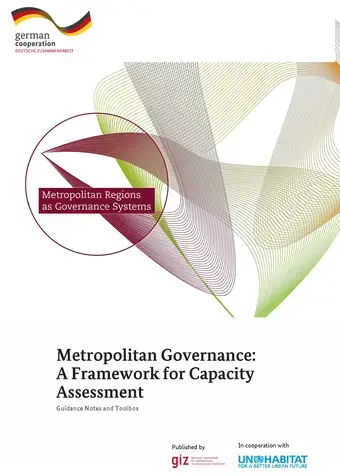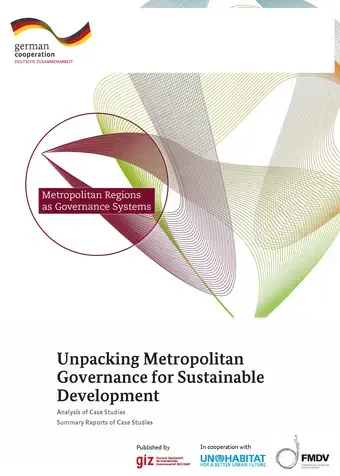
UN-Habitat and GIZ have developed the Metropolitan Capacity Assessment Methodology (MetroCAM) as a joint contribution to implement urban sustainable development agendas and bring them to the metropolitan scale. It complements the Unpacking Metropolitan Governance series. With this modular toolbox, urban stakeholders are able to assess existing capacity in a metropolitan setting, future needs, and potential trigger points and finally identify options for change. By tackling a particular metropolitan challenge, the MetroCAM provides instruments and incentives for municipalities to cooperate beyond administrative boundaries.
The MetroCAM is also a process to foster dialogue and build consensus. The first part of the methodology illustrates the required initial steps for a successful assessment, covering aspects like the composition of the assessment team, finding consensus on the most pressing metropolitan challenge and sequencing activities based on resource and time constraints. The heart of the methodology comprises of 12 tools – a bouquet of options which can be selected regarding the specific needs and challenges. The methodology is primarily directed to local and regional governments’ representatives willing to drive the change and engages urban practitioners, metropolitan actors, researchers and development organisations.

This case study analysis forms part of the publication series “Unpacking metropolitan governance” that documents experiences and gives hands-on approaches for stakeholders in the field of sustainable development of metropolitan regions. The analysis and the summary reports of the case studies of Metropolitan Bandung (Indonesia), Guadalajara Metropolitan Area (Mexico) and e-Thekwini (Durban, South Africa) are following the joint publication of the discussion paper “Unpacking Metropolitan Governance for Sustainable Development”, UN-Habitat, GIZ and FMDV encourage a critical and intensive discussion among policy makers and practitioners about the findings and recommendations offered by the discussion paper, case study reports, and analyses. The publication series shall serve as a reference point for the ongoing international discussion on transforming urbanization, implementing the Sustainable Development Goals at the local and metropolitan level and thereby contribute to the Habitat III debate.
In addition, GIZ and UN-Habitat have developed a Metropolitan Capacity Assessment Methodology as a modular toolbox to assess existing capacity in a metropolitan setting, future needs, and identify options for change.
GIS technology has emerged as a powerful set of tools for managing and analysing spatial data (data tied to a specific point or area on the ground). The various types of spatial data are at the core of many development efforts, and GIS is seen as a solution to a number ofproblems local governments face in their area of jurisdiction.
This handbook serves as an introductory guide to geographic information system (GIS) technology for local government and other interested stakeholders. It suggests some common opportunities for GIS application, the benefits a GIS provides to users, and what is required to set up a GIS and sustain it.
Throughout the world, violence, delinquency and fear undermine the basic right of individuals to live in peace and fully benefit from a healthy and sustainable community. These elements make no real distinction between prosperous and poor cities, and impose aconsiderable cost on the population, particularly through the decline of communities, the increase in health and security expenditures and the deterioration of investments. Violence and fear directly threaten life in society, good governance and the sustainable development of the world’s communities and neighbourhoods.
UN-Habitat believes that ICT can be a catalyst to improve governance in towns and cities and help increase levels of participation, efficiency and accountability in public urban policies, provided that the tools are appropriately used, accessible, inclusive and affordable. Research shows that ICT use by youth can have a direct impact on increasing civic engagement, giving them new avenues through which to become informed, shape opinions, get organized, collaborate and take action.
UN-Habitat’s experiences of using the video game Minecraft as a community participation tool for public space design confirms this view and shows that providing youth with ICT tools can promote improved civic engagement. Youth are at the center of the ICT revolution, both as drivers and consumers of technological innovation. They are almost twice as networked as the global population as a whole, with the ICT age gap more pronounced in least developed countries where young people are up to three times more likely to be online than the general population.
The purpose of this paper is to outline UN-Habitat’s approach to using information and communication technology (ICT) as an enabler to encourage youth participation in urban design and governance.
This joint publication “Unpacking Metropolitan Governance for Sustainable Development” is the product of a close cooperation between GIZ and UN-Habitat. Against the background of rapid urbanization, new forms of power relations between the different levels of government emerge and stronger coordination and cooperation is required.
GIZ and UN-Habitat are both convinced that effective metropolitan governance is crucial for transformative development, considering social, political, economic and environmental impacts. While the subsidiarity principle is still valid and valuable, some decisions are most effectively implemented at a metropolitan level that follows the functional area. Climate change, natural disasters or economic development do not stop at administrative boundaries, hence joint action needs to be taken.
Infrastructure needs can be better solved through joint forces and coordination between administrations and different stakeholders. This study shall give insights into ways metropolitan regions are governed and how it relates with the good urban governance principles.
In addition, GIZ and UN-Habitat have developed a Metropolitan Capacity Assessment Methodology as a modular toolbox to assess existing capacity in a metropolitan setting, future needs, and identify options for change.
Governance is about the processes by which public policy decisions are made and implemented. ICT can become a catalyst to improve governance in towns and cities and help increase the levels of participation, efficiency and accountability in public urban policies, provided that the tools are appropriately used, accessible and affordable. This book examines how ICT enabled governance is applied to urban policy design and highlights case studies, tools, methodologies, all reflecting current challenges and potential for the use of ICT in governance processes in cities.
Cities are assets, solutions and drivers of economic and social development. Cities possess huge untapped economic potential that can and should be leveraged to create wealth and economic opportunities for all. This requires good urban planning that supports urban compactness, integration, and connectivity. However, even the best urban plans risk ending up unused if they are not accompanied by financial and regulatory strategies for implementation. Strategic public investments must go hand in hand with strategic funding mechanisms and supporting governance systems.
The report also identifies successful governance mechanisms for efficient and equitable provision of public services in metropolitan areas of developing countries, and shares experiences and methods to making public service provision more viable in peri-urban areas of large cities and in smaller urban centres of these countries.
This report presents the outcomes of UN-HABITAT 's International Conference on Decentralization, Local Governance and Service Delivery: Sharing Experience and Sustaining Progress in Urban Iraq, which took place in Amman, Jordan from 8-10 May 2011.
The objective of the conference was to provide an opportunity for Iraqi Local Government Association representatives to learn, experience and benefit from the process of decentralization and development of local governments in other selected countries. The conference provided a focused practical perspective on how decentralization in urban areas promotes local government as an effective tool for service delivery
El Programa Conjunto “Redes para la convivencia, comunidades sin miedo”, del Fondo para el Logro de los Objetivos de Desarrollo del Milenio (F-ODM), también conocido como “Ventana de Paz”, aspira a convertir nueve cantones1 en comunidades sin miedo, con una apuesta en el ámbito local y promoviendo redes locales de convivencia pacífica que permitan desarrollar acciones enfocadas en la prevención de la violencia, la promoción de la paz y la seguridad ciudadana.El accionar de ONU-Habitat, como una de las Agencias del Sistema de las Naciones Unidas en Costa Rica, y en asocio con las instituciones contraparte (Ministerio de Justicia y Paz, Ministerio de Educación y Ministerio de Seguridad), implementadorasde este Programa Conjunto, se orienta por los lineamientos de trabajo de su Programa Global Ciudades más Seguras, cuyos objetivos principales son aumentar las capacidades a nivel urbano y local para contener la inseguridad y contribuir al establecimiento de una cultura de prevención.